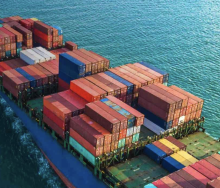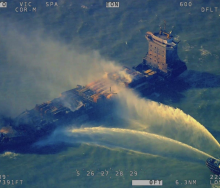After maritime trade experts predict a normalization of shipping traffic in the Red Sea by the second quarter of 2025, contingent on sustained peace in the region, renewed tension in the Middle East is mounting on the back of threats by the governments of the US and Israel.
Earlier this week President Donald Trump warned Hamas to release all hostages taken on October 7, 2023, by this coming weekend or face a resumption of military intervention, possibly with increased American participation.
His counterpart in Tel Aviv, Benjamin Netanyahu, has since also threatened to send the Israeli Defence Force (IDF) back into Gaza unless all hostages are released, despite the ceasefire agreement stating that a set number of hostages must be released on a weekly basis.
Now, as an uneasy peace has settled on the Red Sea, Yemen’s Houthi movement has issued a stark warning, threatening to recommence attacks on maritime traffic in the Red Sea and against Israel should the IDF resume their military operations in Gaza.
The Houthis, who control a significant portion of Yemen under the militia banner of Ansar Allah, have made it clear that their continued cessation of hostilities is directly contingent on the maintenance of the current ceasefire between Israel and Hamas.
A spokesperson for the group stated that they stood ready to strike targets within Israel if the assault on Gaza was reignited.
"Our commitment to avoiding further escalation is dependent on Israel's adherence to the ceasefire," a Houthi representative declared.
"Should they resume their aggression against our Palestinian brothers and sisters in Gaza, we will not hesitate to respond accordingly."
The group has also warned of potential retaliatory measures against the United States and the United Kingdom, stating they will reinstate sanctions and potentially target US and UK vessels if airstrikes are launched against Houthi-controlled territories.
"Let it be known that any renewed aggression against us will be met with a swift and decisive response," the spokesperson added.
"We will not stand idly by while innocent civilians are under attack."
Scepticism remains regarding the Houthi's pledge to halt attacks on non-Israeli vessels, given their track record of inaccurate targeting and use of misinformation.
Concerns are mounting that the fragile truce could collapse, prompting a return to military activities if the Gaza ceasefire falters or if the US and British militaries strike further targets in Yemen.
Previously, the Houthis announced their intention to target vessels en route to Israel from the Mediterranean Sea, as well as ships and companies of any nationality known to be supplying and entering Israel if the IDF launched an offensive on Rafah.
The Houthis' actions have already had a significant impact on shipping through the Red Sea, disrupting key trade routes and impacting revenues.
Despite the declared pause in attacks, traffic through the Bab el Mandeb Strait, where the Red Sea meets the Gulf of Aden, has not returned to pre-conflict levels, indicating a continued sense of unease within the shipping industry.
The situation remains highly volatile, with the potential for further escalation looming large.













